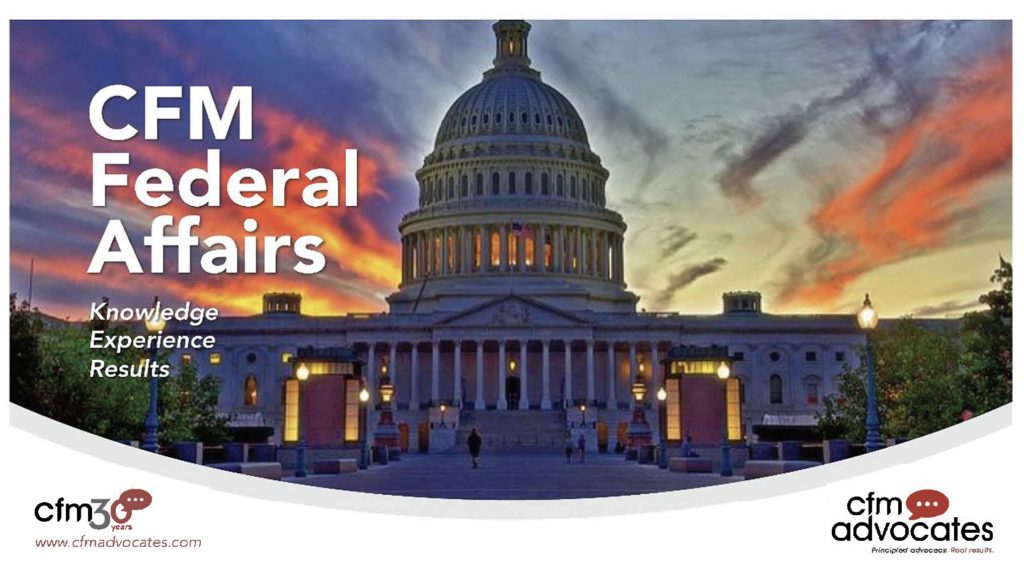
Expect Congress this week to pass a short extension of the deadline to approve a year-end, stopgap spending bill, which also may contain another coronavirus stimulus package. Current federal spending authority ends Thursday. There also is a time crunch because many provisions of the CARES Act expire the end of this year.
Congressional leaders late last week dropped the hint of further delay as negotiators reportedly inch closer to deals on both an omnibus spending measure and coronavirus financial relief. Apparently, there isn’t agreement on either proposal, but there is bipartisan, bicameral agreement to keep government running and avoid a shutdown just before the holidays.
Negotiations on coronavirus financial relief center on a $908 billion proposal developed by a bipartisan group of lawmakers. The proposal would provide slimmed-down supplemental unemployment insurance payments, including for gig workers, and funding for small businesses, schools, health care facilities, transit agencies and student loans. There also is $160 billion for states and local government, some of which is intended to cover the cost of distributing a COVID-19 vaccine starting later this month. Layoffs caused by the pandemic have led to increased enrollment in Medicaid, which will put more pressure on state budgets.
Senate Republicans continue to push for liability protection from coronavirus-related lawsuits and many GOP lawmakers favor a smaller overall package. House Democrats want more funding for financially strapped state and local governments, which may be forced to lay off employees. Prospects for another round of direct payments appears to have dimmed.
It’s unclear where the Trump White House stands in the negotiations. President-elect Joe Biden has called for a larger overall financial relief package to prevent the nation from falling into a deeper, longer recession, a view generally supported by Federal Reserve Board Chair Jerome Powell.
Two issues that haven’t received as much attention as expected in the negotiations are pending evictions and growing lines at food banks. The moratorium on evictions for non-payment of rent expires at the end of the year and could impact renters, landlords and communities already overwhelmed by enlarging homeless populations. Lines at food banks are getting longer as more people exhaust their savings, can’t pay their bills and require food assistance. Food banks may face shortages after the first of the year.
Two issues that haven’t received as much attention as expected in the negotiations are pending evictions and growing lines at food banks. Many renters face eviction when the moratorium expires. And many food banks may start to run short of food to share if economic recovery sputters in the new year.
Hospitals are filling up and overflowing from a new surge in COVID-19 cases, which is straining their critical care and staff capacities. Hospital officials have found ways to expand the number of available beds, but they say that’s of little use without the medical personnel to care for patients in those beds. There could be a push to recruit and train badly needed nurses and caregivers.
Public health officials worry the current surge in coronavirus cases will be exacerbated as more families travel and gather during the approaching holiday season. Such a surge could add to the already daunting challenges faced by hospitals, force renewed economic lockdowns and intensify overall economic distress.
Despite the toll in lives and livelihoods lost in the pandemic, the Trump administration – and the President himself – appears more consumed with quixotically challenging election results, rushing Arctic oil leases and federal prisoner executions, exacting political revenge on those viewed as disloyal and mulling potential presidential pardons.
Meanwhile, Biden has signaled battling the ravages of COVID-19 will be his top priority, as he ramps up his transition work group that will advise him before and after he is inaugurated January 20. Starting last week, Biden transition officials were able to begin coordinating with their outgoing Trump administration counterparts, including on issues such as vaccine distribution.
Biden will likely face a worsening economy when he steps into the White House next month. Hopes that robust economic recovery would continue, thus diminishing the need for another larger dose of federal financial stimulus, suffered a blow when the number of new jobs created in October fell below expectations. Equally worrisome, employment statistics indicate a growing number of workers, many of them of women, are deserting the job market, which could result in skilled worker shortages that complicate post-pandemic recovery.
Perhaps the largest obstacle in the way of economic recovery are the uneven effects of pandemic lockdowns. White-collar professionals continued to work, shifting from offices to their homes. The pandemic hasn’t been as gentle on small businesses forced to close or hourly workers at retail outlets that have given way to online sales.
Some economists see economic silver linings. Housing sales continue to boom. For those still working, not spending money on vacations and restaurants has contributed to increase the overall US savings rate, which suggests some consumers will have money to spare to propel economic recovery.
The stock market has rallied on news of pending COVID-19 vaccine approvals for emergency use. Assuming the Federal Food and Drug Administration approves applications from Pfizer and Moderna for their respective vaccines, vaccinations for high-risk health care workers and elderly patients could begin by the end of this month. However, vaccines for the general public may not be available until well into next spring.




